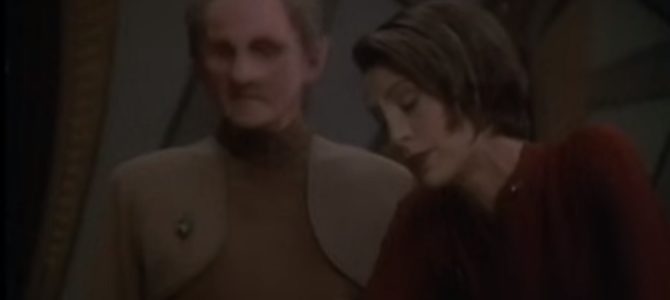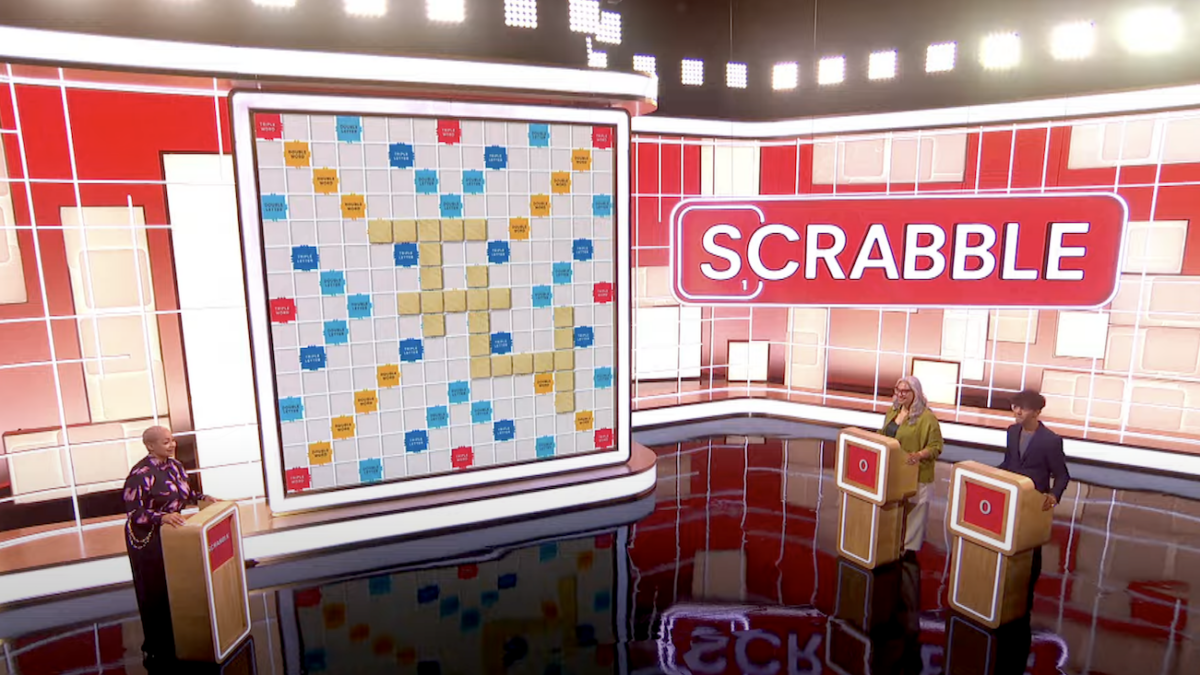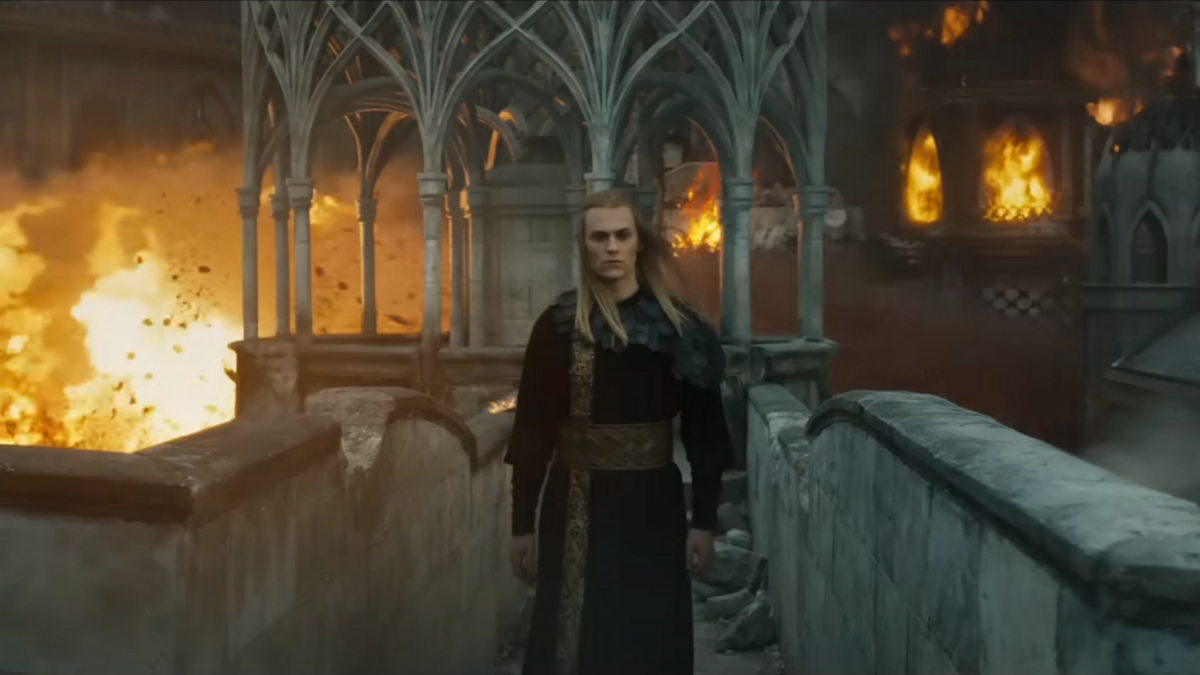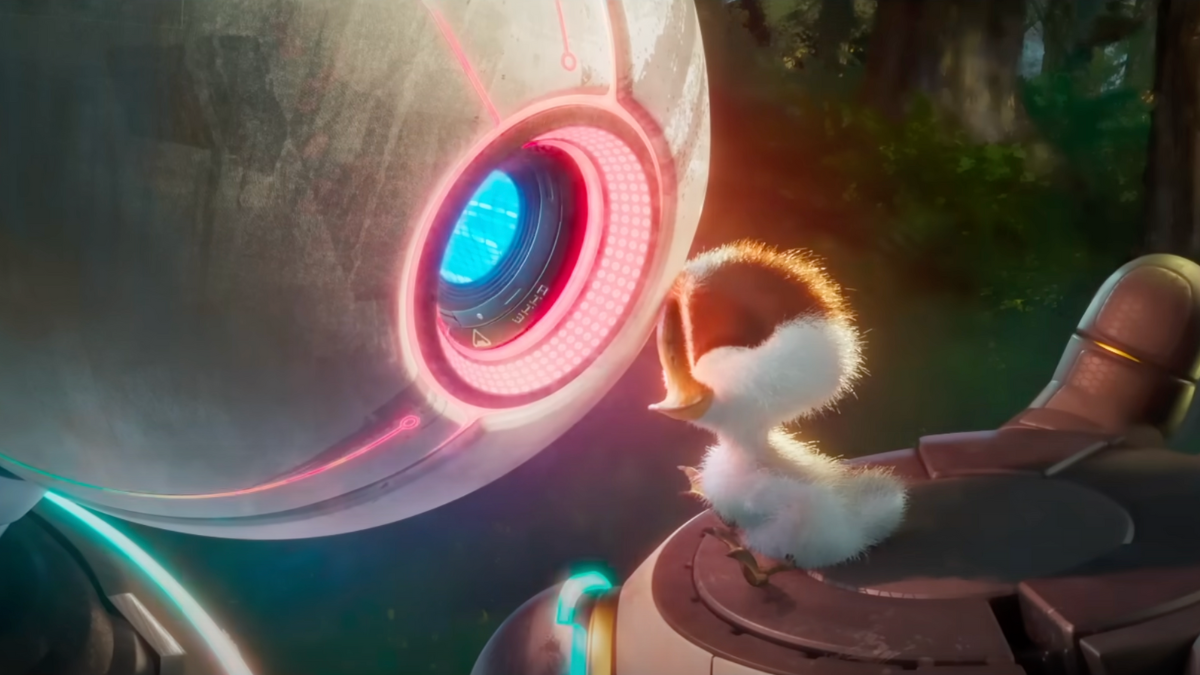
In episode seven of “Star Trek: Deep Space Nine’s” first season, the title “Dax” tells us immediately which character will be the focus of the story. The episode is part courtroom drama, part Appalachian murder ballad, and all in all a fairly enjoyable episode.
As is becoming traditional, the episode opens with Bashir trying and failing to pick up some woman. In this case, the woman is Jadzia-Dax, who shoots him down succinctly and politely when he offers to walk her home at the end of an evening. After she leaves, Bashir resolves to follow her anyway—in the twenty-first century, we call this “stalking”—and it turns out to be a good thing, when he finds her being abducted by three men.
Bashir joins the fight (instead of, say, calling for help) and takes a beating. Lying in the corridor, he finally calls station security. The kidnappers seem to know the station well and hack its security measures, but the crew gets them back online in time for Sisko to snag the alien ship in a tractor beam and haul it, and Dax, back to the station.
The “kidnappers” turn out to be representatives of the court system of another nation, called Klaestron, who want to prosecute Dax for a 30-year-old murder. The lead kidnapper is named Ilon Tandro (played by Gregory Itzin). He is also the prosecutor and the son of the victim, General Ardelon Tandro.
The younger Tandro wants justice for his father and has convinced the powers that be on his homeworld to charge Dax with murder and, somehow, treason. The problem that quickly emerges is that the crime happened before Jadzia was born. Tandro wants Jadzia-Dax to answer for the alleged crime of the previous host of the Dax Trill, Curzon.
Kira is bothered that the Klaestronians (Klaestronites? Klaestroners?) chose to kidnap Dax instead of presenting a warrant for her extradition. She suspects it is because the weirdness of the case’s underlying issue—is Jadzia-Dax responsible for the acts of Curzon-Dax?—but is also aggrieved that the Klaestron cops had detained knowledge of the station and its security systems, which she suspects they got from their ally, the Cardassians. While the Federation has an extradition treaty with Klaestron, Bajor does not.
This is enough for her (with Sisko’s agreement) to order a hearing be held under Bajoran law to determine whether they can take Dax back to their planet for prosecution. That’s already a lot of law talk, and the episode has barely gotten started. It is worth noting, perhaps, that kidnapping criminal suspects from a foreign country is not as crazy as it sounds.
In international law, the principle of male captus bene detentus means that even someone captured in an irregular fashion abroad may be brought into court if the charge against him is valid. This is why Israel’s capture of Adolf Eichmann in 1960 in Argentina was considered valid under international law (it was still condemned by the United Nations, naturally). It’s an old-fashioned bit of doctrine, but it’s still true in real-life and, apparently, in the twenty-fourth century as well.
The hearing is held at Quark’s bar, probably to avoid the expense of building a new set. That’s odd, but not out of place with American frontier life, which often centered on taverns as the main gathering place in a town. The U.S. Marines were famously founded in Philadelphia’s Tun Tavern, and parts of the pretrial examination in the Salem Witch Trials took place in a tavern. The tradition continued as the frontier moved west. As a kind of frontier station itself, “Deep Space Nine” follows in this old tradition.
At any rate, the hearing is supposed to be about extradition, but necessarily evolves into a discussion of the underlying case itself, with two issues being disputed: was this Dax the same person as the last Dax, and did either of the versions of Dax actually commit the crime?
The “lawyers” (Sisko stands in as Dax’s counsel, for some reason, as is traditional on Star Trek court episodes) debate, through their examinations of various witnesses, whether Jadzia-Dax was culpable for Curzon-Dax’s crimes. Neither seems able to fully defeat the other’s arguments, and the answer is hard to pin down.
Jadzia remembers Curzon’s actions just as she remembers her own, but the both halves of the personality blend in a merged Trill. Who is to say which is the “bad” half?
Meanwhile, Odo travels to Klaestron to investigate what really happened 30 years ago when Ardelon Tandro was killed. He interviews the general’s widow, Enina (Fionnula Flanagan) who explains that when her husband was killed Klaestron was in the midst of a civil war.
Curzon-Dax was there to help negotiate a peace treaty, and he and general had become close friends. Someone notified the enemy of the general’s travel plans one night and he was ambushed and killed. The act galvanized his people, who won their civil war and made Ardelon a posthumous hero.
Although the whole episode is about her, Dax has said almost nothing this entire time. She does not participate in her own defense, to Sisko’s immense frustration, and offers no alibi or other evidence of her/Curzon’s innocence. Odo returns to the station with Enina as the hearing is still going on (Klaestron is nearby, presumably). Ilon, the prosecutor, is exasperated to see his mother there, especially as she appears to favor his opponent’s side of things.
Enina testifies and, at last, the whole story of Ardelon’s death is revealed. Like the old country standard “Long Black Veil,” Dax’s alibi is true, but one he would not reveal:
The judge said, son, what is your alibi?
If you were somewhere else, then you won’t have to die
I spoke not a word, though it meant my life
I had been in the arms of my best friend’s wife
Dax is innocent of the killing, but was guilty of a non-criminal indiscretion of adultery with his friend’s wife. The case falls apart with the evidence that Curzon-Dax had cuckolded Ilon’s father, but had not murdered him.
Enina accepts that her people will shame her for cheating on their national hero but, as she tells Jadzia-Dax after the trial, it is preferable to the alternative: the truth was that Ardelon revealed his travel plans himself, and was on his way to defect to the enemy.
There are a few loose ends. We never really figure out if one Trill host can be made to answer for the crimes of another (the Bajoran court is as judicially minimalist as our own Chief Justice John Roberts.) The throwaway line at the end about the hero really having been a traitor also raises more questions than it answers: if he was defecting, why did the rebels kill him? And what of the odious collaboration between the Cardassians and Klaestron in Dax’s capture?
None of these topics are resolved, and Klaestron itself is scarcely mentioned again for the rest of the series. But this problem was more common in the days of episodic television, and we should not expect minor themes to carry over, as good as that would be for world-building and viewer immersion. These quibbles aside, it is an enjoyable, if not spectacular episode.









